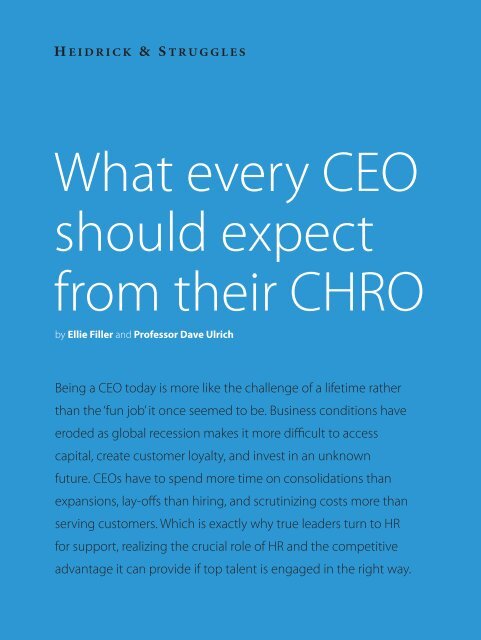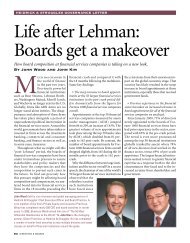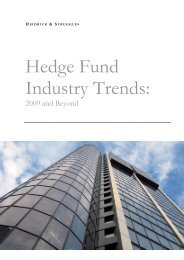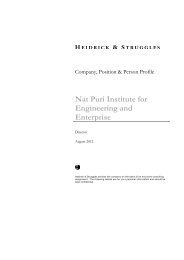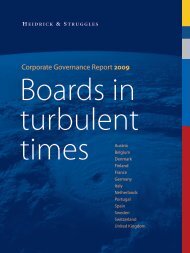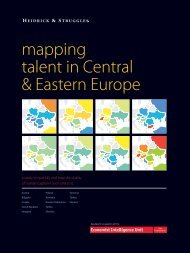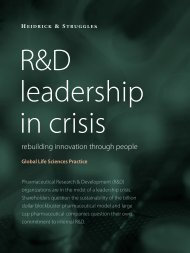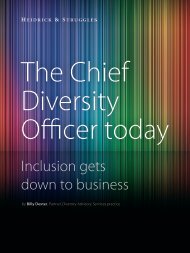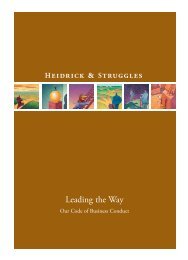What every CEO should expect from their CHRO - Heidrick & Struggles
What every CEO should expect from their CHRO - Heidrick & Struggles
What every CEO should expect from their CHRO - Heidrick & Struggles
You also want an ePaper? Increase the reach of your titles
YUMPU automatically turns print PDFs into web optimized ePapers that Google loves.
<strong>What</strong> <strong>every</strong> <strong>CEO</strong><br />
<strong>should</strong> <strong>expect</strong><br />
<strong>from</strong> <strong>their</strong> <strong>CHRO</strong><br />
by Ellie Filler and Professor Dave Ulrich<br />
Being a <strong>CEO</strong> today is more like the challenge of a lifetime rather<br />
than the ‘fun job’ it once seemed to be. Business conditions have<br />
eroded as global recession makes it more difficult to access<br />
capital, create customer loyalty, and invest in an unknown<br />
future. <strong>CEO</strong>s have to spend more time on consolidations than<br />
expansions, lay-offs than hiring, and scrutinizing costs more than<br />
serving customers. Which is exactly why true leaders turn to HR<br />
for support, realizing the crucial role of HR and the competitive<br />
advantage it can provide if top talent is engaged in the right way.
<strong>What</strong> is remarkable is that in these<br />
difficult times, good <strong>CEO</strong>s become<br />
better. They find the personal<br />
resolve to not only enable them to<br />
cope, but to lead <strong>their</strong> organizations<br />
to a brighter future. They discover<br />
that leading in difficult times is<br />
neither random nor ad hoc. <strong>CEO</strong>s<br />
who lead are able to master the<br />
inevitable paradoxes of cutting costs<br />
while at the same time growing<br />
through innovation and geographic<br />
expansion; manage for the short<br />
term and at the same time invest<br />
in the future; reduce employee<br />
benefits and at the same time<br />
engage key employees; and tighten<br />
budgets while at the same time<br />
encouraging innovation.<br />
Talent Management<br />
– a key differentiator<br />
To lead through these paradoxes, <strong>CEO</strong>s realize that<br />
talented, well functioning teams become an even<br />
greater differentiator. In tough times, top talent<br />
will still have the same or even more opportunities<br />
elsewhere, so strengthening the ‘A’ grade players<br />
and ensuring <strong>their</strong> engagement becomes a primary<br />
<strong>CEO</strong> agenda item. While some firms are relying on<br />
2 <strong>What</strong> <strong>every</strong> <strong>CEO</strong> <strong>should</strong> <strong>expect</strong> <strong>from</strong> <strong>their</strong> <strong>CHRO</strong><br />
government bail outs, top <strong>CEO</strong>s realize that bailing<br />
out <strong>their</strong> companies focuses on the symptom not<br />
the problem. The metaphor of a bail out comes<br />
<strong>from</strong> removing water <strong>from</strong> a sinking boat. If the<br />
hole in the boat is not fixed, any amount of bail out<br />
will ultimately fail. <strong>CEO</strong>s need to find and fix the<br />
managerial holes while rebuilding and reshaping the<br />
boat. Economic pressures give leaders license to act<br />
boldly to assess and upgrade <strong>their</strong> talent. Economic<br />
pressures need not lead to psychological recessions.<br />
Leaders need to continue to instill confidence not<br />
only in investors and customers, but in employees<br />
who will turn to leaders for a sense of hope and<br />
confidence. When leaders respond to increased<br />
economic demands by involving and improving<br />
<strong>their</strong> talent and building <strong>their</strong> teams, they create<br />
organizations that increase productivity today while<br />
preparing to respond to the future.<br />
<strong>CEO</strong>s and <strong>CHRO</strong>s –<br />
working hand in hand<br />
While <strong>CEO</strong>s are ultimately responsible for managing<br />
talent in turbulent times, they <strong>should</strong> have a close<br />
ally in <strong>their</strong> Chief Human Resources Officer. In the<br />
last fifteen years, the human resources field has<br />
shifted attention <strong>from</strong> the transaction work of<br />
administering employee needs and setting policies,<br />
to the more strategic work of helping organizations<br />
build capabilities to respond to customers and<br />
increase confidence <strong>from</strong> investors. When talent<br />
becomes a primary competitive differentiator, <strong>CEO</strong>s<br />
<strong>should</strong> be able to turn to <strong>their</strong> <strong>CHRO</strong>s as personal<br />
coaches, architects, and allies in the creation of<br />
responsive organizations. We have found that<br />
too often while <strong>CEO</strong>s increasingly have higher<br />
<strong>expect</strong>ations and demands for <strong>CHRO</strong>s, some HR
leaders are retrenching, taking fewer risks, and<br />
returning to <strong>their</strong> administrative work as a safe<br />
haven and comfort zone.<br />
<strong>CHRO</strong>s <strong>should</strong> have deep understanding about<br />
employees in the organization and offer creative<br />
solutions on how to find, motivate, engage, and<br />
keep them. It is also about creating flexibility within<br />
the organization to ensure more is done with fewer<br />
people. The <strong>CHRO</strong> <strong>should</strong> be able to recognize<br />
current compensation demands like financial<br />
restraints on executive pay, but find creative ways<br />
to engage and value top talent. They <strong>should</strong> be<br />
disciplined at removing work so that remaining<br />
workers are not <strong>expect</strong>ed to accomplish historic<br />
workloads. They <strong>should</strong> be adept at helping to craft<br />
a simple strategic story that unites the employees<br />
inside with the customers and investors outside.<br />
They <strong>should</strong> be knowledgeable about how to<br />
make that story become real through words,<br />
symbols, and HR practices. They <strong>should</strong> be able<br />
to define the leadership brand that connects<br />
customer <strong>expect</strong>ations to employee actions.<br />
They <strong>should</strong> be constantly building and assessing<br />
next generation leadership. They <strong>should</strong> be able<br />
to redesign organizational roles and routines,<br />
streamlining operations to ensure efficiency<br />
and accountability. They <strong>should</strong> be aware of the<br />
unintended consequences of <strong>their</strong> actions as they<br />
shape a culture that endures over time. They <strong>should</strong><br />
recognize the impact of decision-making and<br />
resource allocation in getting the best ideas and in<br />
involving others. They <strong>should</strong> be sensitive to the<br />
enduring values of the company and how to ensure<br />
that those values continually guide tough business<br />
decisions; they, together with the executive team<br />
need to act as the guardians of the organization and<br />
3 <strong>What</strong> <strong>every</strong> <strong>CEO</strong> <strong>should</strong> <strong>expect</strong> <strong>from</strong> <strong>their</strong> <strong>CHRO</strong><br />
its brand, helping to develop a positive employer<br />
brand. The role of the true ‘business partner’ – a<br />
phrase so often misused today, encompasses all of<br />
these factors at a time when business needs them<br />
the most.<br />
How well does your<br />
<strong>CHRO</strong> support you?<br />
To make sure <strong>CHRO</strong>s are responding to these<br />
opportunities, we have prepared a list of questions<br />
that <strong>CEO</strong>s <strong>should</strong> be asking about <strong>their</strong> <strong>CHRO</strong>s:<br />
Strategic understanding<br />
and business acumen<br />
Does your <strong>CHRO</strong> really understand how your<br />
business makes money? It is vogue for HR work to<br />
be linked to strategy, but your <strong>CHRO</strong> <strong>should</strong> look<br />
through the strategy to understand customers and<br />
investors and know what they need and why they<br />
give money to your firm.<br />
Does your <strong>CHRO</strong> have strategic vision? Or the<br />
ability to see what might be coming around the<br />
corner in terms of business demands (e.g., investor<br />
or customer <strong>expect</strong>ations), talent requirements (e.g.,<br />
retirements looming), government regulation (e.g.,<br />
global green initiatives). You want a <strong>CHRO</strong> who can<br />
anticipate the future and act today.<br />
Does your <strong>CHRO</strong> have global instincts and<br />
recognize the trade offs of local autonomy and<br />
global leverage? You want a <strong>CHRO</strong> who ensures<br />
that your organization is fully diverse, respecting<br />
not only demographics differences (race, gender,<br />
age, orientation), but global differences as you make<br />
decisions.
Does your <strong>CHRO</strong> have the business gravitas to<br />
remedy and take tough positions not only on<br />
HR but on the business? When you are facing<br />
significant business decisions, does your <strong>CHRO</strong> have<br />
a voice? Take a stand? Bring new insights into the<br />
discussion?<br />
Does your <strong>CHRO</strong> have the ability to prioritize and<br />
focus HR investments? Not <strong>every</strong>thing worth doing<br />
is worth doing well. It is important to prioritize and<br />
focus on things that matter most.<br />
Branding and corporate culture<br />
Does your <strong>CHRO</strong> help you transfer your brand to<br />
your culture? A sustainable culture comes when the<br />
<strong>expect</strong>ations of customers and investors transfer to<br />
leadership behaviors, corporate initiatives, employee<br />
actions, and managerial processes. You want a <strong>CHRO</strong><br />
who bridges the outside and the inside.<br />
Does your <strong>CHRO</strong> balance your team’s discussions<br />
so that if you tend to talk about short-term<br />
responses, your <strong>CHRO</strong> will remind you of the<br />
long-term implications? But if you over-weigh<br />
long-term direction, your <strong>CHRO</strong> will bring you back<br />
to the present?<br />
Does your <strong>CHRO</strong> not only manage talent<br />
and individual ability, but teamwork and<br />
organization capability? You want a <strong>CHRO</strong> who<br />
can build an organization that outlasts you and your<br />
current leadership team.<br />
Leadership and team work<br />
Does your <strong>CHRO</strong> have the ability to work as part<br />
of your executive team? Complex problems will not<br />
be solved by individual contributors, but by team<br />
contributors. Can your <strong>CHRO</strong> work productively with<br />
marketing to provide the talent and organization<br />
4 <strong>What</strong> <strong>every</strong> <strong>CEO</strong> <strong>should</strong> <strong>expect</strong> <strong>from</strong> <strong>their</strong> <strong>CHRO</strong><br />
to serve customers, with finance to manage costs<br />
and operate within budgets, with manufacturing to<br />
ensure efficiency, and with other members of your<br />
management team?<br />
Does your <strong>CHRO</strong> have the ability to credibly<br />
lead the HR function? This means setting strategy,<br />
making things happen, upgrading to a strong HR<br />
team, and building personal credibility inside and<br />
outside HR.<br />
Can your <strong>CHRO</strong> make things happen? Legacy HR<br />
has often been guilty of rhetoric and activity rather<br />
than results and outcomes. You want a <strong>CHRO</strong> who<br />
has the tenacity and determination to get things<br />
done.<br />
Does your <strong>CHRO</strong> have your trust and confidence<br />
and challenge you when appropriate? You want a<br />
<strong>CHRO</strong> whom you rely on to tell you the truth about<br />
your managerial efforts and your organizational<br />
initiatives.<br />
<strong>What</strong> we have laid out is a high bar for the role<br />
of HR. When we spoke to a <strong>CEO</strong> who recently<br />
interviewed two external candidates for the <strong>CHRO</strong><br />
job, it became clear what is <strong>expect</strong>ed of today’s<br />
<strong>CHRO</strong>. Both candidates were well trained, broadly<br />
experienced, and highly recommended. On being<br />
asked what he would bring to the company, the first<br />
candidate talked about his experience in hiring and<br />
promoting people based on rigorous competency<br />
models, on being able to manage the complexities<br />
of base salary, bonus, and stock options, and on<br />
having created a leadership academy for future<br />
leaders. The second candidate guaranteed that<br />
through HR investments, the organization would<br />
have 10% greater innovation than other competitors<br />
as measured by revenues <strong>from</strong> products and services<br />
created in the previous three years, reduce costs
y 5%, increase employee productivity and morale,<br />
be first to market with new products services, and<br />
gain customer share <strong>from</strong> targeted customers. The<br />
first candidate focused on HR activities, the second<br />
on business outcomes. In demanding markets, <strong>CEO</strong>s<br />
want <strong>CHRO</strong>s who participate fully with them in<br />
creating business success by focusing on outcomes<br />
not activities.<br />
Six key competencies<br />
Our research reveals what top <strong>CHRO</strong>s must do to<br />
perform against the questions we raise, delivering<br />
the results the <strong>CEO</strong> demands. We have identified six<br />
competencies that you <strong>should</strong> see in your <strong>CHRO</strong>:<br />
Credible activist: Your <strong>CHRO</strong> <strong>should</strong> be credible<br />
in that you trust them but they are also an activist<br />
who takes a position on what the business needs<br />
to succeed. This means being them being an active<br />
participant in business discussions not only on HR,<br />
but business issues too.<br />
Business ally: Your <strong>CHRO</strong> <strong>should</strong> know the business.<br />
This means knowing the external world in which<br />
you operate including the business environment,<br />
technological changes, industry trends, and<br />
government regulations. It means passing a<br />
business literacy test on how you make money, serve<br />
customers, and differentiate <strong>from</strong> competitors.<br />
Strategic architect: Your <strong>CHRO</strong> <strong>should</strong> contribute<br />
to shaping and delivering strategy. This means<br />
that your <strong>CHRO</strong> can help you write your strategic<br />
story and then work to make it real through HR<br />
practices and leadership behaviors. In addition, the<br />
<strong>CHRO</strong> can manage the process of creating strategy<br />
and of communicating it inside and outside the<br />
organization.<br />
5 <strong>What</strong> <strong>every</strong> <strong>CEO</strong> <strong>should</strong> <strong>expect</strong> <strong>from</strong> <strong>their</strong> <strong>CHRO</strong><br />
Operational executor: Your <strong>CHRO</strong> <strong>should</strong> be able to<br />
deliver the HR basics on time <strong>every</strong> time. This means<br />
that the administrative work of HR is accomplished<br />
with flawless execution.<br />
HR practice expertise: Your <strong>CHRO</strong> <strong>should</strong> bring<br />
innovative and aligned HR practices and procedures<br />
into the firm. This means that your <strong>CHRO</strong> needs to<br />
have varied experiences on how to manage people<br />
(staffing, training, downsizing), how to manage<br />
performance and link it sustainably to compensation<br />
and benefits, how to communicate and share<br />
information, and how to design an organization<br />
during both growth and challenging times.<br />
Change and culture change: Your <strong>CHRO</strong> <strong>should</strong> be<br />
able to make things happen and change the pattern<br />
of work. This means that your <strong>CHRO</strong> has the ability<br />
to turn ideas into actions and to conceptualize and<br />
manage culture and be able to maneuver others by<br />
getting them to see the short and long term horizon<br />
In summary<br />
In difficult times, <strong>CEO</strong>s have a demanding and<br />
arduous job. But, they need not work alone. It is<br />
not only good but necessary for <strong>CEO</strong>s to demand<br />
more <strong>from</strong> <strong>their</strong> <strong>CHRO</strong>s. Without a fully competent<br />
and engaged <strong>CHRO</strong>, the <strong>CEO</strong>s ability to succeed<br />
is severely limited. The role of the <strong>CHRO</strong> is more<br />
critical now than it has ever been. We observe this<br />
as we engage with our clients and hear <strong>their</strong> clear<br />
<strong>expect</strong>ations on the value the HR function <strong>should</strong><br />
bring. Meanwhile, companies are seeking specific HR<br />
expertise for <strong>their</strong> non-executive boards, reflecting<br />
the importance of people in any organization’s<br />
strategic direction. <strong>CHRO</strong>s must be ready and<br />
equipped to rise to these challenging times.
Ellie Filler is Managing Partner of the Chief Human<br />
Resources Officer practice in Europe, the Middle East<br />
and Africa.<br />
efiller@heidrick.com<br />
Connecting leaders around the globe is what <strong>Heidrick</strong><br />
& <strong>Struggles</strong> does best. For over fifty years we have<br />
been building deep relationships with the world’s<br />
most talented individuals on behalf of the world’s most<br />
successful companies. Through the strategic acquisition,<br />
development and retention of talent we help our clients<br />
– <strong>from</strong> the most established market giants to the newest<br />
market disrupters – build winning leadership teams.<br />
www.heidrick.com<br />
Copyright ©2009 <strong>Heidrick</strong> & <strong>Struggles</strong> International, Inc.<br />
All rights reserved. Reproduction without permission is prohibited.<br />
Trademarks and logos are copyrights of <strong>their</strong> respective owners.<br />
200901CDTSMI13<br />
Professor Dave Ulrich is Partner and Co-Founder<br />
of The RBL Group and a professor of business at the<br />
Ross School of Business, University of Michigan.<br />
For the past twenty years Professor Ulrich has been<br />
a global pioneer, thought leader and advisor on the<br />
evolution of the <strong>CHRO</strong> function, helping hundreds<br />
of companies improve <strong>their</strong> HR effectiveness. He<br />
is regarded and recognised as a guru in human<br />
resource management, leading the way in education<br />
and consulting.<br />
For more information about Professor Ulrich and<br />
details of his most recent book The Leadership Code:<br />
Five Rules to Lead By, please visit:<br />
www.daveulrich.com


